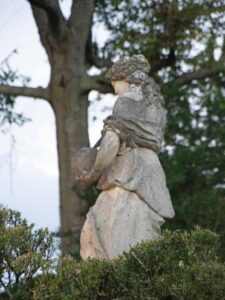Readings: Psalm 125; 2 Kings 2:9-22; Acts 3:17-44
Those who trust in the Lord are like Mount Zion, which cannot be moved, but abides forever.
As the mountains surround Jerusalem, so the Lord surrounds his people, from this time on and forevermore.
For the scepter of wickedness shall not rest on the land allotted to the righteous, so that the righteous might not stretch out their hands to do wrong.
Do good, O Lord, to those who are good, and to those who are upright in their hearts.
But to those who turn aside to their own crooked ways the Lord will lead away with evildoers.
Peace be upon Israel! [Psalm 125, NRSV]
Fig bars, coffee crunch bars, pumpkin whoopie pies with cream cheese filling, and stuffing: I’ve eaten each one in such quantities that I’ve made my gluten free self sick. I’m always sorry I indulged after the fact, but even the intestinal consequences haven’t made them less tempting for me. Rather than face a temptation that I may not be able to pass up, I just don’t keep them around the house (or I make them with gluten free flour – not as tasty as the originals, but a lot easier on my body). Lord, lead me not into this baked good temptation: I am well aware of my willingness to be led astray by these bakery sirens.
It’s a lot easier to be righteous, to do the right thing for God, self, and neighbor, when temptation isn’t beckoning me down the crooked path of self-destruction and self-centeredness. When scepters of wickedness are within view and reach, it’s a lot harder to keep my hands to myself and off of them. Lord, save me from the time of trial; I’m afraid I don’t have it in me to pass such a test.
In a psalm touting the goodness of God’s people, the psalmist was honest enough to note how hard it is to pass up temptation, and wise enough to finish with an exclamatory request that peace remain among the people. Being at peace with what life already offers, perhaps, will keep us from being tempted by what life has not. If flour and sugar concoctions can lead me away from a perfectly good life, who knows what else will take me down a crooked path? Who knows what might take you down that path?
Lord, Help us. Peace be upon us. Please and Amen.


